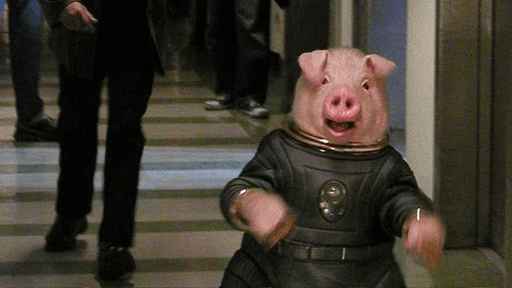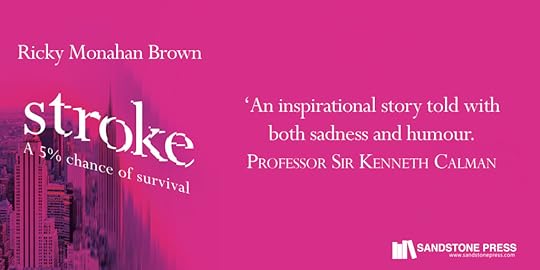Ricky Monahan Brown's Blog, page 3
May 30, 2019
An Imaginary Line
After the last two posts collectively regarding strokes, pigs, and sci-fi (Kicking A Dead Pig and Mind Reading), I recalled that I have a short short story of speculative fiction sitting in a metaphorical drawer about a man suffering quadriplegia, pigs, and sci-fi.
 ‘I must rush to check that out!’ – Doctor Who Space Pig
‘I must rush to check that out!’ – Doctor Who Space PigNow. You might think that all sounds a bit silly. And you might be right. But read on…
[ And in the meantime, visit the Apoplexy Newsletter for a soundtrack to distract you. ]
If you do think that sounds silly, then Congratulations, you’re in esteemed company. Ian McEwan has been at pains recently to promote his new AI novel, Machines Like Me by proclaiming that it is not science fiction.
McEwan’s On Chesil Beach
It pains me to read of this. I first read and enjoyed Ian McEwan’s work when Black Dogs was released in 1992, and then when Enduring Love came out in 1997.
You can click below to read about him…
…drawing an impermeable boundary between literary fiction and science fiction, and placing himself firmly on the respectable side of the line.
‘It drives writers mad’ – The Guardian, 18 Apr 2019
 Is that right, aye?
Is that right, aye?I wonder if he’s really placing himself on the right side of the imaginary line, here. I’ve been recalling again this week JG Ballard’s assertion that

‘I think you’ll find mid-century design is timeless, darling’
Tom Hiddleston in
the
Ballard adap
tation,
High-Rise
Having recently read Rita Indiana’s none-more-contemporary Tentacle – which isn’t so much sci-fi as cli-fi and what-the-fi? – and now currently working through a collection of John Wyndham’s short stories from the forties and fifties, and being a confirmed fan of Philip K. Dick’s Do Androids Dream of Electric Sheep? which is very of-the-moment, I’m inclined to fall on the Ballard side of this argument.
That’s not to say I don’t have some sympathy for McEwan’s point.
There could be an opening of a mental space for novelists to explore this future not in terms of travelling at 10 times the speed of light in anti-gravity boots, but in actually looking at the human dilemmas.
Ian McEwan, there.
 I’m still recovering from Wyndham’s knockabout space opera 38 years later
I’m still recovering from Wyndham’s knockabout space opera 38 years laterLike, anti-gravity boots! Who could possibly imagine that?
I’m glad that Ian Mcewan has, in recent years, been focussing on the real life problems that people can really relate to. Like, the problems of the characters in Sweet Tooth who are facsimiles of the former Director General of MI5 and, er, Ian McEwan. Or the graduate student of history and the sting quartet violinist in On Chesil Beach. Or the respected High Court Judge in The Children Act which was inspired by a rather lovely dinner party the author attended…
Some years ago I found myself at dinner with a handful of judges – a bench is the collective noun. They were talking shop, and I was politely resisting the urge to take notes…
McEwan, again
 ‘And then, because he went to Sussex,
‘And then, because he went to Sussex,McEwan almost passed the port the wrong way!’
Urgh. I’m getting back to the Wyndham. At least his stuffed shirts and Mars colonists are delivered with a degree of self-awareness. Till next time…
Share this:





April 28, 2019
Mind Reading
Let’s stay with the stroke / medical science / sci-fi Venn diagram this week, after last week’s Night of the Living Pigs.
 Yay!!!
Yay!!!In the endless battle against FAKE NEWS!!! Aunty Beeb trailed a story last week about how computers can read our minds now.
[ I’m sensing… you want some more whimsy and a soundtrack from the Apoplexy Newsletter ]
Their story – you guessed it – quickly backed off from that claim. Nevertheless, the real story as reported in National Geographic was no less amazing.
[Researchers] hope to help people who have been robbed of their ability to speak by conditions such as amyotrophic lateral sclerosis / motor neurone disease and strokes.
NAtional geographic, APRIL 24, 2019
 ‘So, Ah says tae Big Jeanette, Isa and the Sandras, Ah says…’
‘So, Ah says tae Big Jeanette, Isa and the Sandras, Ah says…’It turns out that the science that led to the promise of this awesomeness isn’t so different from the tests that I was undergoing at the end of last year.
Y’see, patients… were already being monitored for epileptic seizures, with stamp-size arrays of electrodes placed directly on the surfaces of their brains. OK then, a bit more invasive than my home telemetry test. But anyway –
as the participants read off hundreds of sentences—some from classic children’s stories such as Sleeping Beauty and Alice in Wonderland—the electrodes monitored slight fluctuations in the brain’s voltage, which computer models learned to correlate with their speech.
 Did someone say ‘classic story’?
Did someone say ‘classic story’?Computer models connected these variations with a complex simulation of a vocal tract in order to effect a translation into synthesised speech. As Christian Herff, a postdoctoral researcher who studies similar brain-activity-to-speech methods, observes, it’s a very, very elegant approach, and I commend the whole article to you.
Here’s my favourite line:
Researchers also stress that these systems do not equate to mind-reading: The studies monitored only the brain regions that orchestrate the vocal tract’s movements during conscious speech.
emphasis added
 So your testimony is that
So your testimony is that‘Computers can read our minds now’?
Sure, Your Honour, let’s go with that.
NEXT WEEK, how we go from speech synthesis to this –
 Don’t have nightmares!
Don’t have nightmares!Share this:





April 22, 2019
Kicking A Dead Pig
Long-suffering readers of the blog may have noticed that I often use these posts to grapple with subjects of which I don’t yet have a grasp.
 What can I say? I like a broad palette.
What can I say? I like a broad palette.VfL Bochum there, using a pretty broad palette for their 1997 kit.
So, when Long-Suffering Reader Of The Blog Paul asked me if the pig thing [was] lighting up my various comms channels, I was thrilled to discover that The Pig Thing was A Thing that needed both grappling and grasping.
Check out the Apoplexy Newsletter for some light relief
and some tunes to accompany the following…
Mythbusters assured their audience that no pigs were harmed when they looked into catching greased pigs…
So. What’s The Pig Thing?
Scientists restore some brain cell functions in pigs four hours after death
Washington Post, 17 april 2019
Yep, that’s pretty much it. Except, there’s a lot more to it than that. Firstly, and most importantly for apoplectic.me, the team from Yale that were doing this work said the work they had been doing could provide a new way to study the brain, and even help in the development and testing of new therapies for stroke and other conditions in which bloodflow to parts of the brain is blocked, causing cells to die.
 The Work They Had Been Doing
The Work They Had Been DoingMakes my double trepanation look pretty low-grade, eh?
What we’re looking at there, apparently, is part of a process whereby the scientists used a cocktail of synthetic fluids – BrainEx – designed to halt cellular degeneration and restore cellular functions, such as metabolic activity to restore some cellular function in pig brains from animals decapitated four hours earlier at a local slaughterhouse.
 Live footage after the pigs screwed their heads back on
Live footage after the pigs screwed their heads back onThe pigs’ brains, according to the Washington Post report, remained by any traditional definition, dead.
But the study suggests that brain cells are hardier than previously thought, said study co-author and Yale neuroscientist Nenad Sestan.
 Are you quite sure about that?
Are you quite sure about that?Notwithstanding all that, the researchers used a chemical blocker to inhibit overall brain activity. The scientists say this helped the brain cells avoid stress.
But the blocker also ensured the pig brain would not have any risk of awareness… [T]he researchers… were prepared to chill the brains and apply anaesthetic if they saw [electrical brain] activity.
 ‘Don’t worry – we’ve chilled the brain’
‘Don’t worry – we’ve chilled the brain’Now you realise that Squealer from Animal Farm – a small, white, fat porker who served as minister of propaganda – until recently served as the UK’s Secretary of State for Foreign and Commonwealth Affairs, Brexit sorry, I mean BrainEx-inspired thoughts may be running through your brain.
As the Post has it
Such a head-snapping experiment inevitably generates nightmarish scenarios involving live brains in vats, brain transplants, the Zombie Apocalypse, and other mad-scientist story lines (brilliantly crafted, somehow, by neurons firing away inside the skulls of conventionally living human beings).
Doesn’t it?! More about that next week, if you can stay away from our new Zombie Pig Overlords…

Share this:





April 17, 2019
Truth Hides
I was in the supermarket today, and the first thing I saw was a pile of pizzas for LESS THAN HALF PRICE!!! Simultaneously, I had two thoughts:
That must be actually true. They couldn’t get away with it otherwise.Or have they just gone for such a brazen lie that I’m going to think, That must be actually true. They couldn’t get away with it otherwise?
Then I thought, I doubt Goebbels runs the marketing here; let’s just buy a pizza.
[ That’ll take ten minutes to heat up. Check out the Apoplexy Newsletter while you wait. ]
My book Stroke opens with an Author’s Note more or less along the following lines:
Many of us stroke survivors find our way to narratives that make some sort of sense of our experiences and losses. I’ve tried my best to tell my story accurately in a way that makes sense to me. Some names and identifying characteristics have been changed and a composite character or two appears. Throughout most of this story, my brain is broken, and I hope you’ll make allowances for that.
I know, I should have had a career in politics. Here’s Big Treeza telling the poetic truth –
February 26, 2019
Life’s What You Make It
Earlier this week, a friend who makes a brief cameo appearance in my survival memoir, Stroke: A 5% chance of survival, sent me a link to this recent article celebrating the original release of Pavement’s album Crooked Rain, Crooked Rain. Here’s the tl;dr take:
 I was there, kid. That’s not how it went down.
I was there, kid. That’s not how it went down.I mean, I was there. Not James Murphy. Though he probably was, too. I saw Pavement touring their first album, the epochal Slanted and Enchanted, at Edinburgh’s late and legendary venue, The, er, Venue.
That’s quite enough sub-muso-journo dross from me. Get to the human reflection below.
And in the Apoplectic Tiny Letter.
Well, not quite enough. Sorry!
The article introduces footage of the band on The Tonight Show as follows:
Crooked Rain was a relative commercial success… landing the band on Jay Leno’s Tonight Show when this was quite an honor. This compelled the band, of course, to treat the gig with even more contempt than usual.
That *is* quite a lot of contempt
To be fair, the performance still captures the energy that could leave a mark on a former Scottish teenager 27 years after S+E. As such, it’s a pretty good answer to the question what would you do if you ended up on the flagship late night show of General Electric’s house channel when it was hosted by the current host of Jay Leno’s Garage.
 #sadnessinhiseyes
#sadnessinhiseyesOr maybe you’re not a smart-aleck jerk and you wouldn’t wilfully screw up your big shot at becoming Smashing Pumpkins or Stone Temple Pilots or Pearl Jam or something. Let’s just say that it’s probably a good thing that being on the cusp of alt-rock stardom isn’t in my future.
Y’see, Stroke is – I’d like to think – pretty approachable. It’s certainly written to be that way. It’s a positive story that hopefully offers hope and/or solace to stroke survivors and/or their loved ones.
 “The sun shone, having no alternative, on the nothing new.”
“The sun shone, having no alternative, on the nothing new.”Yeah. Mate, I don’t want to tell you how to write, but let’s go with My unlikely miracle breezed in. Bit more positive. Upbeat.
I’m very fortunate, and the snippet from my life that is Stroke – while occasionally sad or bloody – reflects that. But. Contrast a recently completed short story that ends on a note of hope when it turns out that the young man travelling a devastated post-Brexit apocalyptic landscape is, unknown to him, taking the same journey for the 8,000,001st time.
 Actual reference picture, from Threads
Actual reference picture, from ThreadsIt is a hopeful story. Honest.
Another story that I did for Interrobang’s Field Work ends with the narrator exhorting her unborn son to propagate actual hope, and
[k]eep my story and tell it to your children and light a lamp for them. Light a lamp for the people you meet, the people you touch.
Unbeknownst to the casual reader, the unborn child is this guy.
Yeah. The stuff that I and the world allow out in public tends to have a few more laughs.
Bob does cheery
I got to thinking about this contrast when I learned of the death yesterday of Mark Hollis, the co-founder, lead singer and principal songwriter of the band Talk Talk.
Now, he was a bit of a genius, so let’s not dwell on that. Here’s how Guy Garvey of Elbow spoke of Hollis to Mojo magazine in 2012:
Mark Hollis started from punk and by his own admission he had no musical ability. To go from only having the urge, to writing some of the most timeless, intricate and original music ever is as impressive as the moon landings for me.
 “GIRFUY”
“GIRFUY”When Hollis released his only solo album in 1998, he spoke about his decision not to tour anymore or maintain a public persona –
I choose for my family. Maybe others are capable of doing it, but I can’t go on tour and be a good dad at the same time.
The centrepiece of the album Mark Hollis is a song inspired by the true story of a young man who died in World War I. But for all the sparse minimalism of that album, the little that I’ve read about Mark Hollis’s life after he disbanded Talk Talk in 1991 suggests that he had won at life on his terms. Taking a very different tack to Steven Malkmus and Pavement.
I’m going to have to dig out my Talk Talk stuff, and track down Mark Hollis. Not that he’d care, but it feels sad to me that – as is so often the case – it takes his death for that to happen.
The songs that keep going and keep you going – thanks to Mark Hollis and TalkTalk pic.twitter.com/CWdJCsbiYq
— Phantom Power (@PhantomPower14) February 26, 2019
I’ll leave you with this
Share this:





February 11, 2019
Tusk
I haven’t written much on the blog recently that’s directly about Brexit. Partly, the reason is that I’m continually hearing news stories and vox pops and politicians and business leaders on the radio banging on about it and I’m thinking –
Why do I keep hearing about this? What has this got to do with me? Why does this affect anyone I know?
Then I remember and I’m absolutely furious.
What is process for removing our EU citizenship? Voting yes. #scotdecides
— Better Together (@UK_Together) September 2, 2014
But, hey. Brexit isn’t all bad…
[ Read on to find out the good stuff. But first, check out the Apoplexy Tiny Letter ]
You see, without Brexit, Tusk wouldn’t really be on the radar of the people of these islands.
Not that.
That  should be on everyone’s radar already. This
should be on everyone’s radar already. This 
January 21, 2019
Eight Tracks Two
On Christmas Day, I put up a post that predicted the events of the first three months of 2019. Therein, Theresa May faked her own disappearance on Ben Nevis to run out the clock on a No Deal Brexit.

December 25, 2018
A Year In Review – Pt.1
 Times Fly (Fast)
Times Fly (Fast)Time is social. Harvests. Day and night. Diurnal clocks. Biorhythms and cycles. All that mushy wetware bio stuff I never learned but is real.
Long-suffering reader of the blog paul
The winter solstice was on Friday, and now we’re beginning the long dig out towards the long evenings of summer. So, as is traditional, let’s sit down in front of a big gold piano and reflect on the year.
 Yaas, Kween!
Yaas, Kween!January (1)
As the annus horribilis that was 2018 dragged to an end, it seemed that 2019 could only be better. The Queen’s appeal that we put divisions behind us and simply make the best of what we had seemed like it was going to usher in an annus mirabilis as the newly refitted HMS Britannia prepared to begin its buccaneering voyage across an expectant world.
At home, Theresa May announced that she would be combining her passions of hiking and hating immigrants Doing Her Duty to the country by meeting the Hard-Working People of Our Precious Union at the top of the highest peaks in each of Scotland, England, Wales and Northern Ireland.
at the top of the highest peaks in each of Scotland, England, Wales and Northern Ireland.
 “Theresa, do you remember that lovely new visitors’ centre atop Mount Snowdon?”
“Theresa, do you remember that lovely new visitors’ centre atop Mount Snowdon?”After the unexpected cancellation of the Mays’ trip to Snowdonia in Wales, they set off for Ben Nevis in Scotland in traditional wear for the English visitor on a day trip to the Scottish mountains – Theresa in leopard-print kitten heel hiking boots, and Dishy Philip in his preferred Savile Row suit and hipster glasses. As May Maynia gripped the country, enthusiastic Scots began their trek up the mountain…
January (2)
After the disappearance of the Mays in Glen Nevis, another popular favourite had to take to the House of Commons to announce the delay of the Meaningful Vote on the outcome of the UK’s Brexit negotiations with the European Union.
 “The Government intends to proceed with the meaningful vote as soon as the Prime Minister is able to return to this Place” – Deputy Prime Minister David Lidington
“The Government intends to proceed with the meaningful vote as soon as the Prime Minister is able to return to this Place” – Deputy Prime Minister David LidingtonThen, just as it seemed that the fabric of British society would rupture notwithstanding the desires of the Queen, the people were united by the empathy engendered by the release of the paperback of an astonishing new memoir on 22nd January…
 “Are you sure that every word in this Year in Review is true?”
“Are you sure that every word in this Year in Review is true?”February
As the search for the Mays continued, questions began to be asked about the costs that were being incurred. Secretary of State for Scotland David Mundell indicated that he would resign if the costs of the rescue operation exceeded £30,000.
When it was pointed out that Mundell had previously backtracked on promises to resign relating to Brexit outcomes for the Common Fisheries Policy and differentiation for Northern Ireland, he upped the ante considerably.
 “Let me be absolutely clear: In the event I don’t resign, I’ll resign.”
“Let me be absolutely clear: In the event I don’t resign, I’ll resign.”March
As Brexit-related turmoil continued, Gatwick Airport entered its fourth month of flight cancellation. After police had announced in December that the drone that had caused 140,000 passengers to be stranded at the airport simultaneously:
had been discovered; andhad never existed
it emerged that Gatwick itself had never existed. The so-called airport was merely a hoax conjured by mentalist and illusionist Derren Brown. Each of the 140,000 stranded “passengers” was in fact a paid actor. Brown himself had travelled in time to turn-of-the-century Ohio to deliver the plans for powered flight to the Wright brothers, Orville and Wilbur.
 Derren Brown and Wilbur Wright, 1903
Derren Brown and Wilbur Wright, 1903Meanwhile, popular favourite David Lidington returned to the House of Commons to update the country on the status of Brexit.
 “We must honour the PM by effecting the moment of her greatest triumph on 29 March, 2019”
“We must honour the PM by effecting the moment of her greatest triumph on 29 March, 2019”To be continued…
Share this:





December 14, 2018
Be Yr Own Brain Experiment II
No so long ago, I was reading the final proof of my survival memoir, Stroke, before my publisher Sandstone Press sent it off to the printer. If you can’t wait till January for the – I’m reliably informed – beautiful hard copy artefact, you can get a brilliant deal and receive the e-book before Christmas here. Just tell ’em Stroke Bloke sent you, and leave a complimentary review. 
November 13, 2018
Treasure Islands
Happy RLS Day! Robert Louis Stevenson is 168 today.
 Don’t worry, Bob. You don’t look a day over 43.
Don’t worry, Bob. You don’t look a day over 43.He really doesn’t though, does he? Look at the light in those wee eyes! To look at him, you wouldn’t believe that he would be dead by the end of the next year.
[For more personal and whimsical reflections, check out the Apoplexy Tiny Letter.]
In just 44 years, he established himself as a literary celebrity with a collection of work behind him that sees him today as the 26th most translated author in the world. His wiki page presents a list of literary admirers that includes
Jorge Luis Borges, Bertolt Brecht, Marcel Proust, Arthur Conan Doyle, Henry James, Cesare Pavese, Emilio Salgari, Ernest Hemingway, Rudyard Kipling, Jack London, Vladimir Nabokov, J. M. Barrie, and G. K. Chesterton
And he was held in disdain by H.G. Wells – Score!
As a quick aside, I like to think that Borges would love Wikipedia and that one day a note in his handwriting describing it in detail will pop up among Tim Berners-Lee‘s effects.
 Something like Leonardo’s design for a flying machine (1488)
Something like Leonardo’s design for a flying machine (1488)If you follow me on Twitter or like my author page on Facebook or subscribe to the Tiny Letter , you may be aware that Sandstone Press is releasing my book Stroke at the beginning of 2019. Bear with me. This is relevant.
, you may be aware that Sandstone Press is releasing my book Stroke at the beginning of 2019. Bear with me. This is relevant.
You may think that we had difficulty with the title, but it’s part of a master plan to corral all of the intellectual property rights in strokes and take a percentage of all of the healthcare costs accrued treating strokes in the U.S. every year.
 “Yippee! A cut of well over $72Bn a year!”
“Yippee! A cut of well over $72Bn a year!”(I’ve not written about the book here at Apoplectic Me previously, because I’m really looking forward to my own building excitement. Other writers have suggested to me that this is the best bit.)
As part of the preparation for launch on 22 January, I’ve recently been reading proofs of the text of Stroke. That’s what gave rise to this thought –
RLS died of a cerebral haemorrhage at the age I am now. Been thinking how grateful I am that some of the prescient and timeless themes of Stevenson’s life and work – not his style and craft, obviously – bled through a C21st prism into #Stroke. Thanks, Big Man.




